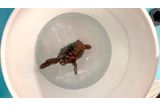What skills do you use every day in your job?
One thing I can say for sure that I got from working in academia is the ability to quickly read, summarize and internalize information from a bunch of sources. Journalism requires a lot of that. Being able to skim through papers – reading the abstract, reading the conclusion, picking the right bits from the middle and so on – that is a life skill.
In terms of other skills, I’m always considering who’s consuming what I’m doing rather than just thinking about how I’d like to say something. You have to think about how it’s going to be received – what’s the person on the street going to hear? Is this clear enough? If I were hearing this for the first time, would I understand it? Putting yourself in someone else’s shoes – be it the listener, reader or viewer – is a skill I employ every day.
What do you like best and least about your job?
The best thing is the variety. I ended up in this business and not in scientific research because of a desire for a greater breadth of experience. And boy, does this job have it. I get to talk to people around the world about what they’re up to, what they see, what it’s like, and how to understand it. And I think that makes me a much more informed person than I would be had I chosen to remain a scientist.
When I did research – and even when I was a science journalist – I thought “I don’t need to think about what’s going on in that part of the world so much because that’s not my area of expertise.” Now I have to, because I’m in this chair every day. I need to know about lots of stuff, and I like that feeling of being more informed.
I suppose what I like the least about my job is the relentlessness of it. It is a newsy time. It’s the flip side of being well informed, you’re forced to confront lots of bad things – the horrors that are going on in the world, the fact that in a lot of places the bad guys are winning.
What do you know today that you wish you knew when you were starting out in your career?
When I started in science journalism, I wasn’t a journalist – I was a scientist pretending to be one. So I was always trying to show off what I already knew as a sort of badge of legitimacy. I would call some professor on a topic that I wasn’t an expert in yet just to have a chat to get up to speed, and I would spend a bunch of time showing off, rabbiting on about what papers I’d read and what I knew, just to feel like I belonged in the room or on that call. And it’s a waste of time. You have to swallow your ego and embrace the idea that you may sound like you don’t know stuff even if you do. You might sound dumber, but that’s okay – you’ll learn more and faster, and you’ll probably annoy people less.
In journalism in particular, you don’t want to preload the question with all of the things that you already know because then the person you’re speaking to can fill in those blanks – and they’re probably going to talk about things you didn’t know you didn’t know, and take your conversation in a different direction.
It’s one of the interesting things about science in general. If you go into a situation with experts, and are open and comfortable about not knowing it all, you’re showing that you understand that nobody can know everything and that science is a learning process.
The post Ask me anything: Jason Palmer – ‘Putting yourself in someone else’s shoes is a skill I employ every day’ appeared first on Physics World.



















